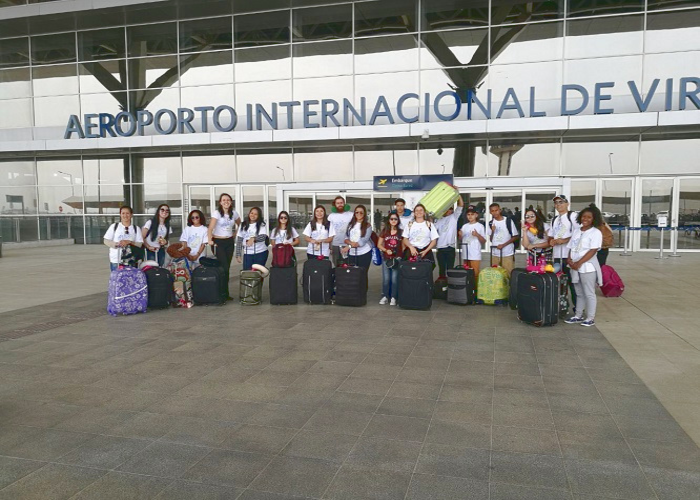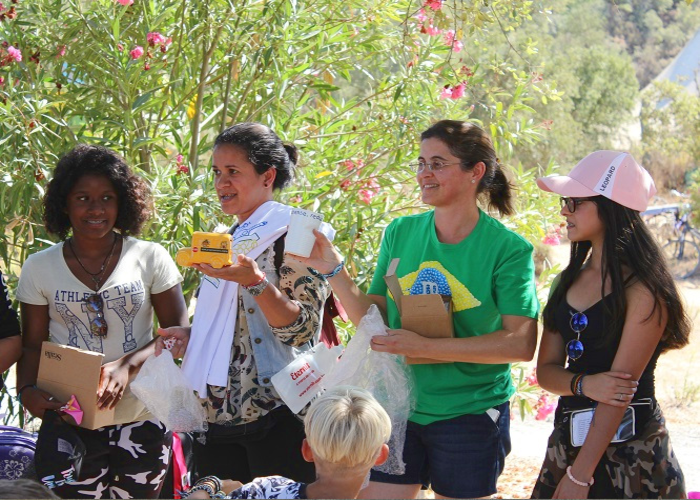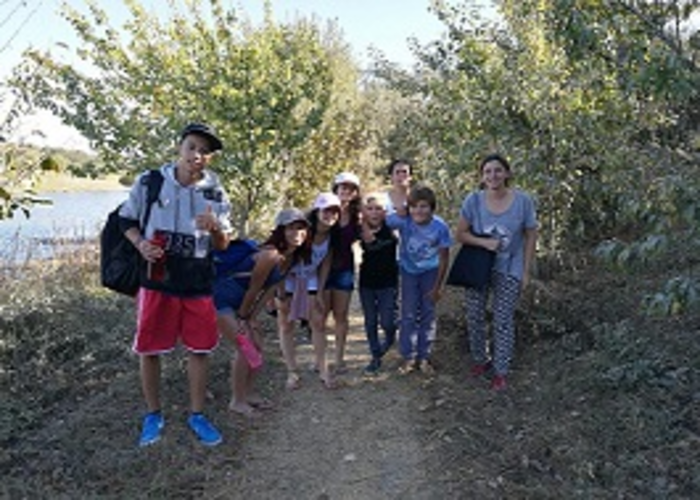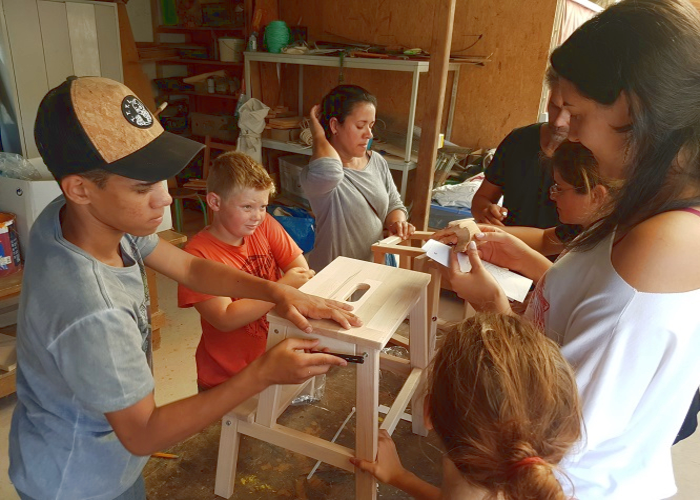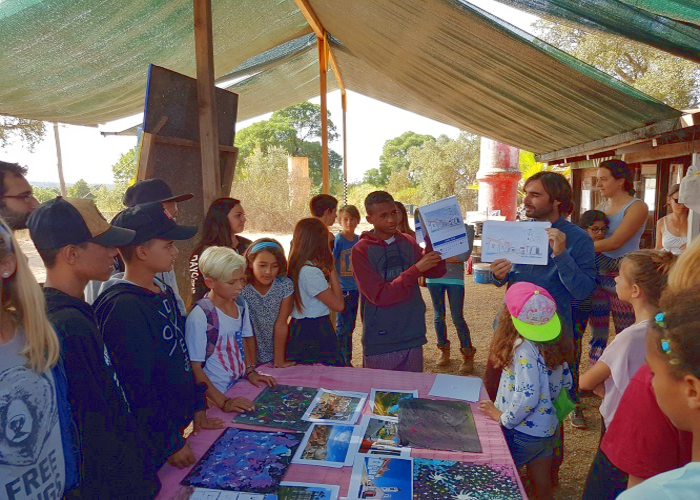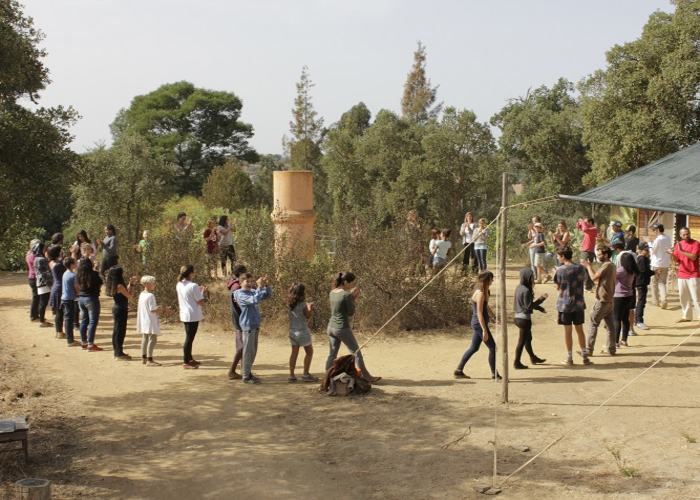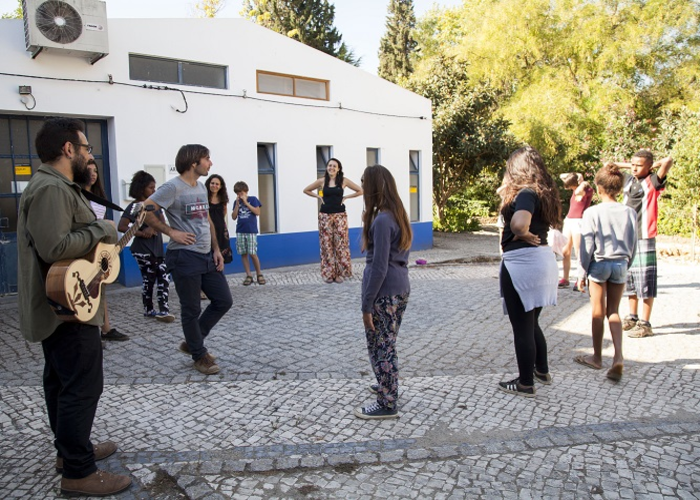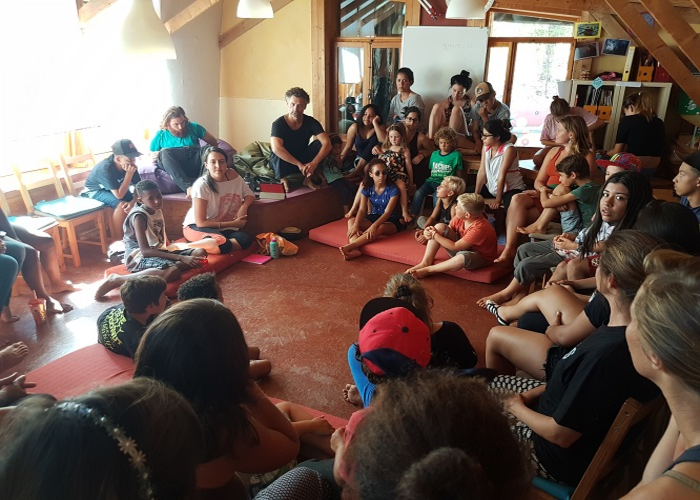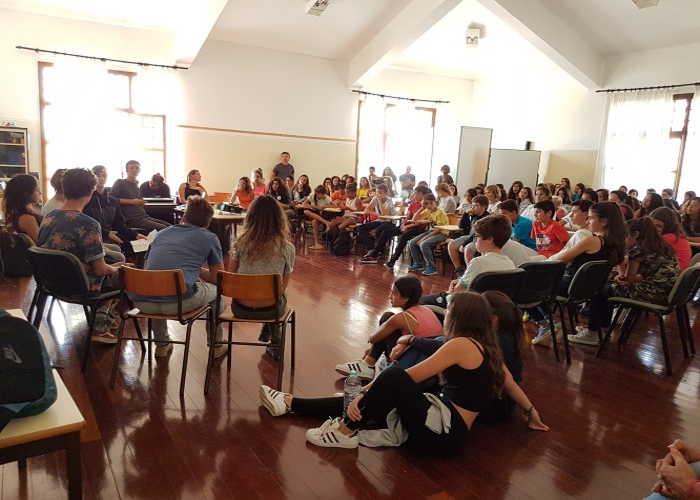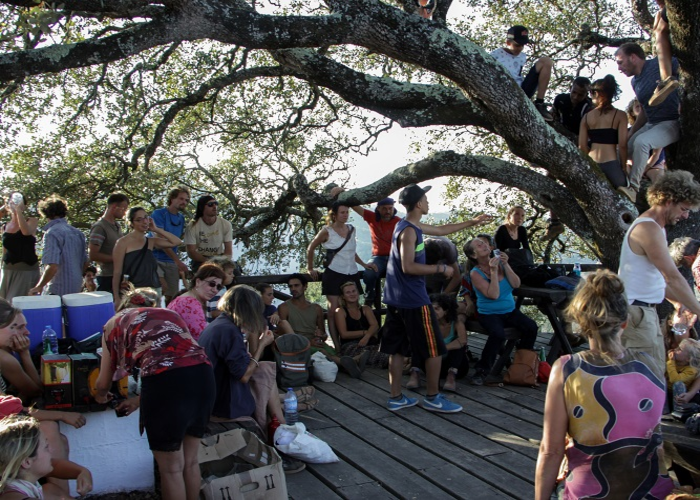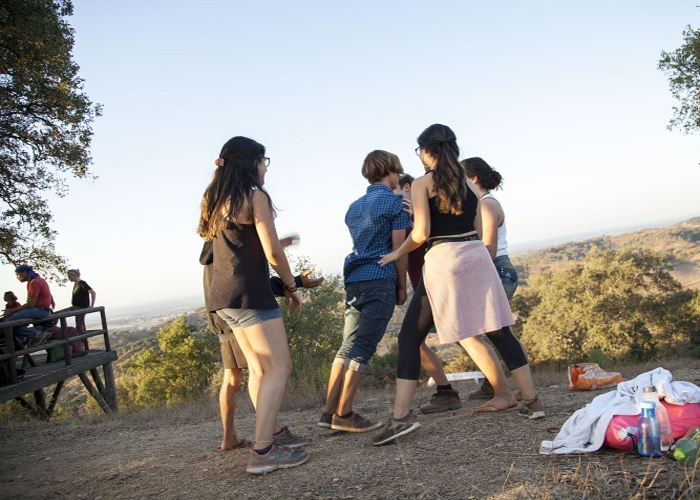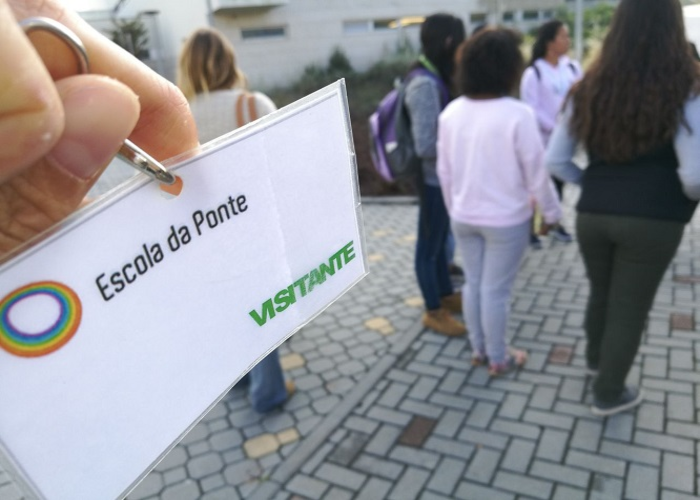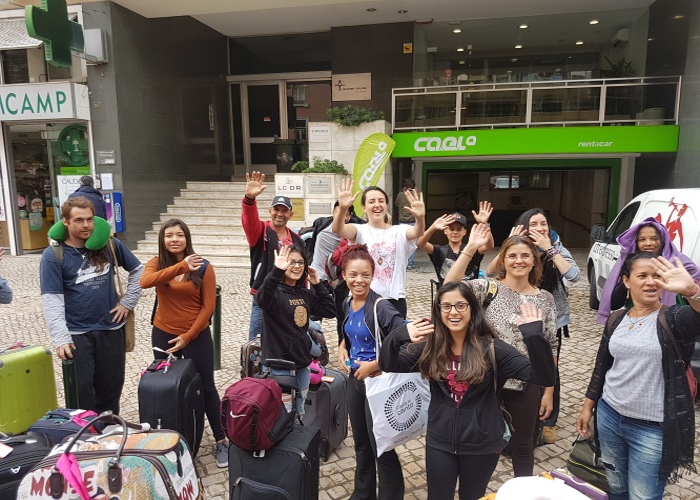Student Exchange: Projeto Âncora (São Paulo, Brazil) – Tamera
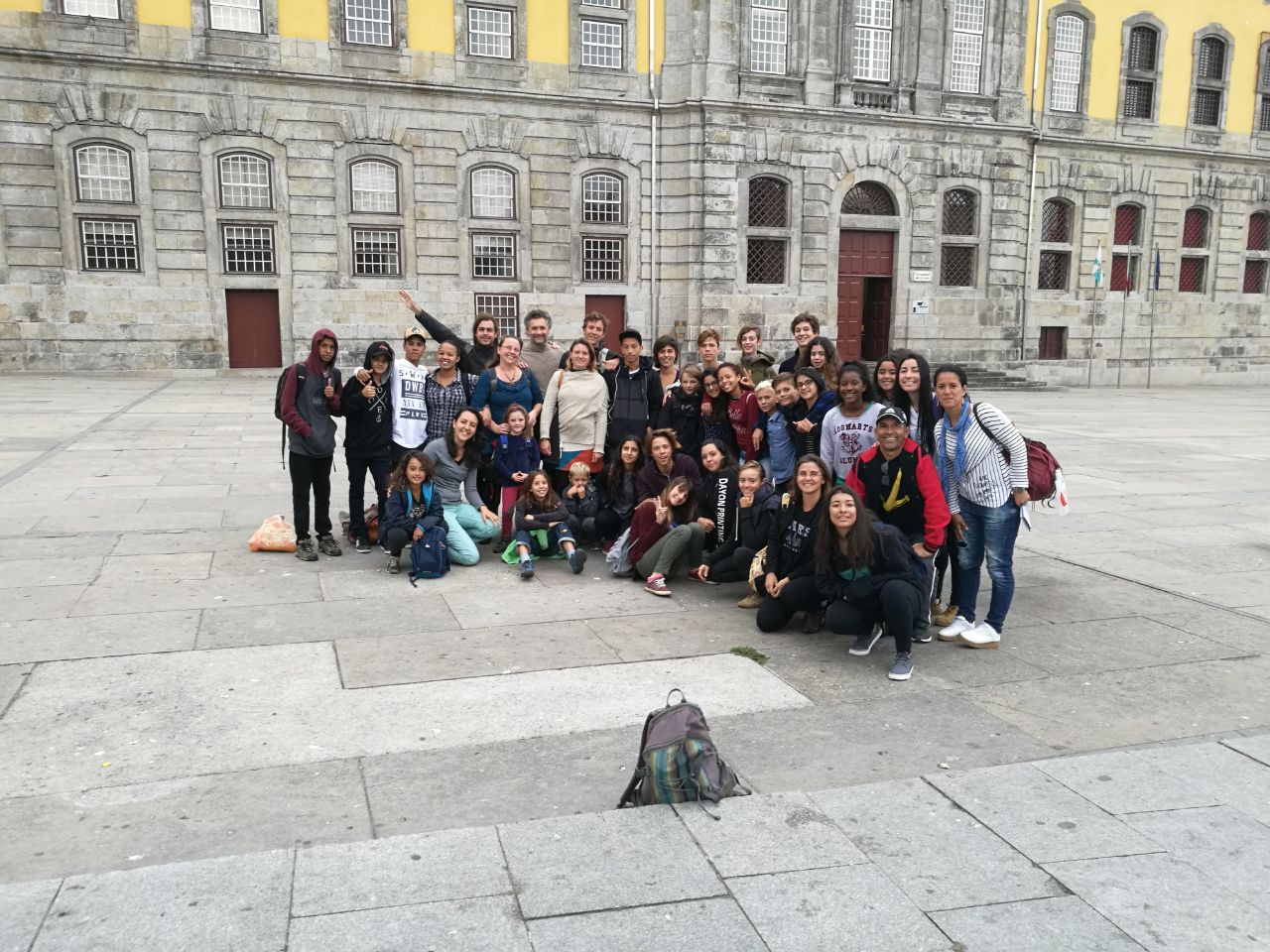
October 2017
After two years of intensive preparation we finally made it happen. From the 1st to the 18th of October, we had eighteen students, two teachers and three parents from the Projeto Âncora visit us in Portugal. After the political journey with our youth group to São Paulo in 2016, where we stayed for two weeks participating at the Projeto Âncora school and lived with their families, now the second part of the student exchange has been manifested.
With joyful celebration we welcomed the group from Brazil at our Place of the Children in Tamera. Some of the kids and teens had already known each other but for many it was the beginning of new friendships. Youth from the low-income areas of São Paulo came to Europe for the first time. What would one in their position expect? Maybe all the projections of richness, consumption and glamour one might associate with European culture. But this group had prepared themselves for a long time to experience a different kind of Europe: the life of a peace research community with all its challenges to manifest a sustainable lifestyle.
On the first afternoon came already the first surprise. We told them that on our land we have a family of wild boars that often come in close contact with humans and that we as a community try to live in cooperation with them and protect them from the hunters of the surrounding areas. Already in the evening of the same day they appeared and came within meters of the group. Surely this was something they had never experienced before.
We had two weeks of project-based learning that met in two groups every morning: Art & the History of Portugal and Following a Cycle of a Sustainable Lifestyle. Already in the first days we had moving experiences. “For the first time in my life I put a seed in the ground,” said one Brazilian girl. There was a lot of joy in the group when they studied and worked through the whole cycle with their own hands- from soil building to sustainable water management to seeding and harvesting food to cooking to composting. Then we took on the issue of energy: biogas and the use of sunlight to cook, melt metal and produce electricity. It’s impressive when a piece of wood begins to burn within 2 seconds after being put in the focused rays of the sun of a Schefler mirror. Last but not least, the biggest challenge: what to do with the “wastes”? We dove right into the issue of compost toilets. Oh, what a riot. “Eeeee! I would never touch that!” said most in the group, until the first one dared to look more closely at the “Black Gold”- the fully decomposed humanure ready for being used as soil. “Wow, this is actually normal and good earth.”
In the art group the students came closer to each other through the joy of painting and handcraft as a means of getting to know Portuguese culture. Wonderful images were created and real artists were suddenly discovered by all. The highlight of this time was a theatrical conversation and exchange about the history of Portugal and especially its colonial history from two perspectives. The perspective of the Portuguese and that of the original people of what is now called Brazil. It is a moment of reconciliation to see the other and to come to understand their story.
Every afternoon the youth went into homestays in different families and groups of Tamera and our close neighbors. After the first shy moments they quickly felt at home. Amongst the youth of Tamera emerged almost professional hosts. Mante, a boy of ten years and the youngest of the group, brought the Brazilian youth every evening to the Cultural Center of Tamera, took care of them and accompanied them back home when they were too afraid to go alone in the dark. The Cultural Center became our evening meeting point, to which every evening more and more of the youth joined for dance, games and socializing.
In our Assembleia, the common meeting point at the end of the week, we were surprised by how quickly the Brazilians had the trust to share about their challenges with the whole group. Long hikes through the countryside which they’d never experienced before, the unfamiliar vegan food, etc. Step-by-step the trust grew to the point where the youth even started to share their intimate questions of friendship, contact and even about the first shy sprouts of having crushes on each other.
Parallel to all of this, we regularly met with the teachers and parents of the two projects. It was a special time of exchange about the learning methods of Projeto Âncora, the “Parents School” and the social and conflict resolution work of Tamera. It was moving to meet other teachers and parents who are working and researching in the same depths about how we can provide the youth the knowledge and experience they will need in order to lead a meaningful life in the future of this planet- social, political, ecological, technological.
In the last two days the whole group (35 people) went to Porto to visit the Escola da Ponte, to get to know another side of Portugal’s culture and history, and to spend another two days in an intense community experience. After a tour of Escola da Ponte by a young student of the school we had a moving conversation about the importance of schools that create new ways of learning. What do they need so that the joy teaching and learning, spirit of community, and common vision endure in meeting all the challenges of a society that does not yet support such novel projects? In this conversation the pride of the students grew about the pedagogical adventure that both the Escola da Esperança and Projeto Âncora have committed to.
We want to thank all those that made this student exchange possible. We thank all teachers, parents, children, youth who decided to take part in this wild experience.
We greet our friends in Brazil.
The exchange will continue…
With joyful celebration we welcomed the group from Brazil at our Place of the Children in Tamera. Some of the kids and teens had already known each other but for many it was the beginning of new friendships. Youth from the low-income areas of São Paulo came to Europe for the first time. What would one in their position expect? Maybe all the projections of richness, consumption and glamour one might associate with European culture. But this group had prepared themselves for a long time to experience a different kind of Europe: the life of a peace research community with all its challenges to manifest a sustainable lifestyle.
On the first afternoon came already the first surprise. We told them that on our land we have a family of wild boars that often come in close contact with humans and that we as a community try to live in cooperation with them and protect them from the hunters of the surrounding areas. Already in the evening of the same day they appeared and came within meters of the group. Surely this was something they had never experienced before.
We had two weeks of project-based learning that met in two groups every morning: Art & the History of Portugal and Following a Cycle of a Sustainable Lifestyle. Already in the first days we had moving experiences. “For the first time in my life I put a seed in the ground,” said one Brazilian girl. There was a lot of joy in the group when they studied and worked through the whole cycle with their own hands- from soil building to sustainable water management to seeding and harvesting food to cooking to composting. Then we took on the issue of energy: biogas and the use of sunlight to cook, melt metal and produce electricity. It’s impressive when a piece of wood begins to burn within 2 seconds after being put in the focused rays of the sun of a Schefler mirror. Last but not least, the biggest challenge: what to do with the “wastes”? We dove right into the issue of compost toilets. Oh, what a riot. “Eeeee! I would never touch that!” said most in the group, until the first one dared to look more closely at the “Black Gold”- the fully decomposed humanure ready for being used as soil. “Wow, this is actually normal and good earth.”
In the art group the students came closer to each other through the joy of painting and handcraft as a means of getting to know Portuguese culture. Wonderful images were created and real artists were suddenly discovered by all. The highlight of this time was a theatrical conversation and exchange about the history of Portugal and especially its colonial history from two perspectives. The perspective of the Portuguese and that of the original people of what is now called Brazil. It is a moment of reconciliation to see the other and to come to understand their story.
Every afternoon the youth went into homestays in different families and groups of Tamera and our close neighbors. After the first shy moments they quickly felt at home. Amongst the youth of Tamera emerged almost professional hosts. Mante, a boy of ten years and the youngest of the group, brought the Brazilian youth every evening to the Cultural Center of Tamera, took care of them and accompanied them back home when they were too afraid to go alone in the dark. The Cultural Center became our evening meeting point, to which every evening more and more of the youth joined for dance, games and socializing.
In our Assembleia, the common meeting point at the end of the week, we were surprised by how quickly the Brazilians had the trust to share about their challenges with the whole group. Long hikes through the countryside which they’d never experienced before, the unfamiliar vegan food, etc. Step-by-step the trust grew to the point where the youth even started to share their intimate questions of friendship, contact and even about the first shy sprouts of having crushes on each other.
Parallel to all of this, we regularly met with the teachers and parents of the two projects. It was a special time of exchange about the learning methods of Projeto Âncora, the “Parents School” and the social and conflict resolution work of Tamera. It was moving to meet other teachers and parents who are working and researching in the same depths about how we can provide the youth the knowledge and experience they will need in order to lead a meaningful life in the future of this planet- social, political, ecological, technological.
In the last two days the whole group (35 people) went to Porto to visit the Escola da Ponte, to get to know another side of Portugal’s culture and history, and to spend another two days in an intense community experience. After a tour of Escola da Ponte by a young student of the school we had a moving conversation about the importance of schools that create new ways of learning. What do they need so that the joy teaching and learning, spirit of community, and common vision endure in meeting all the challenges of a society that does not yet support such novel projects? In this conversation the pride of the students grew about the pedagogical adventure that both the Escola da Esperança and Projeto Âncora have committed to.
We want to thank all those that made this student exchange possible. We thank all teachers, parents, children, youth who decided to take part in this wild experience.
We greet our friends in Brazil.
The exchange will continue…


